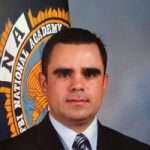By Dr. Jarrod Sadulski, Faculty Member, Criminal Justice, American Military University and Major Efren Muñoz, Criminal Investigation Directorate and INTERPOL, National Police of Colombia
As a criminal justice researcher, I have researched human trafficking and drug trafficking from South American and Central American routes for the past several years. Through American Military University (AMU), I recently had the opportunity to reach a major highlight in my academic career: a visit to Bogotá, Colombia, as a researcher and guest of the Colombian National Police.
During this visit, AMU program director Dr. Chuck Russo and I had the opportunity to visit some of the top Colombian police units dedicated to fighting transnational crimes:
- The Criminal Investigation Directorate and INTERPOL (referred to as DIJIN)
- The Police Anti-Narcotics Directorate (DIRAN)
- The main judicial institution, General Prosecution Office of the Nation
I spoke with leaders from within the Colombian National Police, who oversee counter-narcotics operations and counter-human trafficking operations. One of the most remarkable parts of this research trip was the hospitality and world-renowned professionalism of the Colombian National Police.
During this visit, I gained an in-depth understanding of the dedication and hard work that the Colombian National Police puts forth each day. These professionals not only protect their nation, but also combat international crime problems that plague the world.
Colombian National Police Leader Major Efren Muñoz
One of the leaders within the Colombian National Police whose dedication to serving his country and combating international crime problems who really stood out to me was Major Efren Muñoz. Major Muñoz serves as a Liaison Officer at the Criminal Investigation Directorate and INTERPOL. This role is associated with the General Prosecution Office of the Nation, which is referred to in Colombia as the Fiscalía.
Major Muñoz is a charismatic leader who has dedicated nearly two decades of his life to the Colombian National Police, where he has served on the front lines to support international counter-narcotics operations. He has worked his way upward through the ranks and has served in roles such as a chief of Organized Crime Special Police Units, a chief of the Criminal Investigations Unit, a police instructor, an analyst and a criminal investigator.
Also, Major Muñoz has served as a science, technology and innovation researcher at the Peace Building Police Unit. Earlier in his career, he served as a police station commander in the Risaralda Department of Colombia.
Major Muñoz was responsible for the exceptional research opportunities I had in Colombia. Before my visit, I discovered that Major Muñoz earned a Master of Criminal Justice degree at Boston University and is even a graduate of the FBI National Academy, Session 250, in the United States. That is one of the top accomplishments a law enforcement executive can receive to prepare for leadership in the field of law enforcement.
Major Muñoz’s Personal Experiences from the Field
Economic globalization has allowed crimes worldwide to become more sophisticated, due to better facilities for the flow of money and technological advances in information. In this way, crimes such as human trafficking and drug trafficking have achieved great influence and transnational reach. Criminal networks now act as organized companies, which overcome geographical barriers and generate greater challenges for governments and their police forces.
[Related: Colombia Takes Proactive Stance to Combat Human Trafficking]
In this sense, making projections for this type of crime transformation allows law enforcement to identify criminal scenarios and trends adjusted to a global environment. Standardizing concepts and restructuring judicial processes is necessary to properly face increased security demands.
Achieving a clear prospect of the evolution of crime and its effects requires having highly trained and competitive people, who can contribute to the design, projection, and execution of specialized justice and criminal investigation programs. In addition, Major Muñoz feels that providing effective control strategies to attack criminal power systems from the perspective of their international logic, economic, operational, and territorial action is essential.
Forming International Partnerships with Law Enforcement Leaders from Other Countries
Major Muñoz says that going to the FBI National Academy was one of the most interesting experiences that he has had during his police career. Attending this academy was a perfect opportunity to perfect highly investigative training, exchange knowledge, and learn from the experiences of hundreds of police departments located around the world.
[Related: Developing Global Partnerships to Fight Criminal Acts]
At the FBI National Academy, Major Muñoz met 250 American police officers from all 50 states and 25 international police officers from Europe, Africa, Asia, and Latin America. Today, they all remain connected with one another worldwide, helping each other with information and police orientation. Major Muñoz feels that governments and police force alliances like the relationships he formed at the academy are the best and more effective weapon against transnational organized crime.
Our Trip Showed Us that Some Law Enforcement Experiences Are Common
One of the many takeaways from our research trip was how much in common people in the field of law enforcement have, even on an international basis. Major Muñoz opened the door for my program director and I to perform research and to speak with many experts in the Colombian National Police who focus on human trafficking and drug trafficking.
[Related: The Failing Battle Against Drug Production in Colombia]
Our trip fostered the opportunity to gain a mutual understanding of the work that is being accomplished across two continents to combat human trafficking and drug trafficking. This trip reflected the importance of how AMU and the Colombian National Police can work together to address the global problems of human trafficking and drug trafficking.
About the Authors



Comments are closed.